Fregene: Rome’s one-time glittery beach escape still a slice of paradise for us
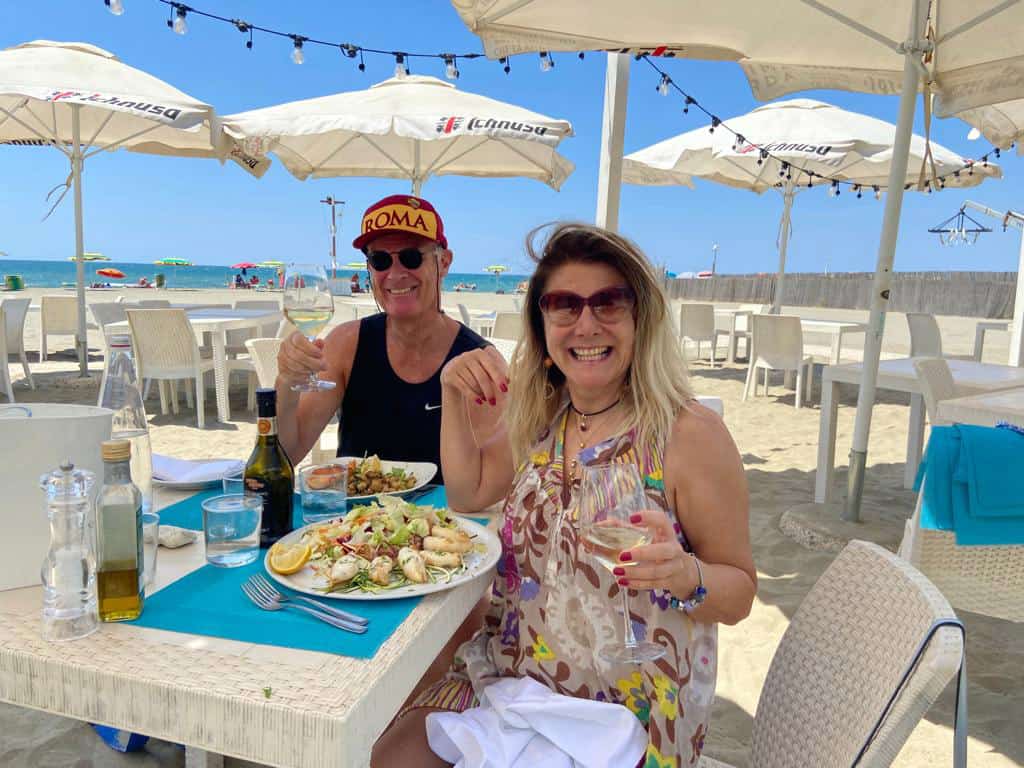
FREGENE, Italy — The scene is always the same. We park Marina’s car on a quiet, narrow side street and walk down the short driveway to Il Capanno dei Pescatori, the little beach-side restaurant that sells us lanais chairs for only 7 euros. A young cabana boy plops them down on an empty beach, pulling up the little movable roofs in case the sun gets too hot. And it always does.
The beach is as smooth as a sand trap at Augusta National. We can’t find a rock until we walk into the Tyrrhenian Sea, cobalt blue and cool on this hot early July morning. On Wednesday, we saw nine people in the water. Not many more laid out in the sand. We read our books, got tan and listened to birds squawk above us.
This isn’t Sardinia’s Costa Smeralda or Sicily’s Taormina. This is Fregene, one of the many little beach towns dotting the coast just outside Rome. Sabaudia. Sperlonga. Anzio. The Lazio region is sprinkled with underrated beach towns that Mussolini — yes, Hitler’s boot-licking sidekick — transformed from swampland. Fregene is the only one, however, that has a forest in the middle of the town. It’s the one where Rome’s glitterati and accompanying paparazzi flocked to in the ‘50s and ‘60s.

Now, it’s people like Marina and me, couples and families wanting a quick beach fix away from steaming Rome. It’s people owning small second homes on the narrow alleys that splice through the old Villaggio dei Pescatori (Fisherman’s Village) that’s alive and well today. The main mode of transport is the bicycle.
The routine
We go early morning and leave by early afternoon when the crowds come. While Italians’ social distance discipline has helped turn the coronavirus here from a deadly pandemic to a mere annoyance, our lives aren’t quite back to normal. Blue Panorama, Italy’s discount airline (“Italy” and “discount airline” should never be in the same sentence together), cancelled all flights to Greece. Our August vacation to Skopelos is out. I inquired about a solo trip to Malta. No airlines are flying from Italy there, either. My housekeeper wants to return home to Ukraine. Nope. We all have resigned ourselves to remain in Italy for the rest of 2020.
I think we’ll survive.
This time, however, Marina and I chose to maximize our time in Fregene and spend the night. We notice that Italian towns, however touristy, change when the day trippers leave and the locals surface. It’s like the corporate executive who goes home at 5 p.m., drops the briefcase, puts on flip-flops and lets his hair down. It’s more comfortable, more real.

I found the lovely Hotel il Miraggio, a sprawling two-level, ivory white house with a huge veranda amidst a big garden. The hotel is only 20 years old but it looks like an old-fashioned Southern mansion. I was going to ask the front desk if the bar sold mint juleps. It’s only 100 meters from the beach and the Miraggio Beach Club, with one of the largest swaths of private beach on the Tyrrhenian and an Olympic-sized swimming pool.
Growing up in Oregon, where all of the wild, savage beaches are public and free, it’s odd paying for what nature meant for the human race. However, as the day grows and we see the public beaches farther down get packed cheek to cheek (and I’m not talking faces), the 7 euros is a small price to pay for privacy and social distancing.
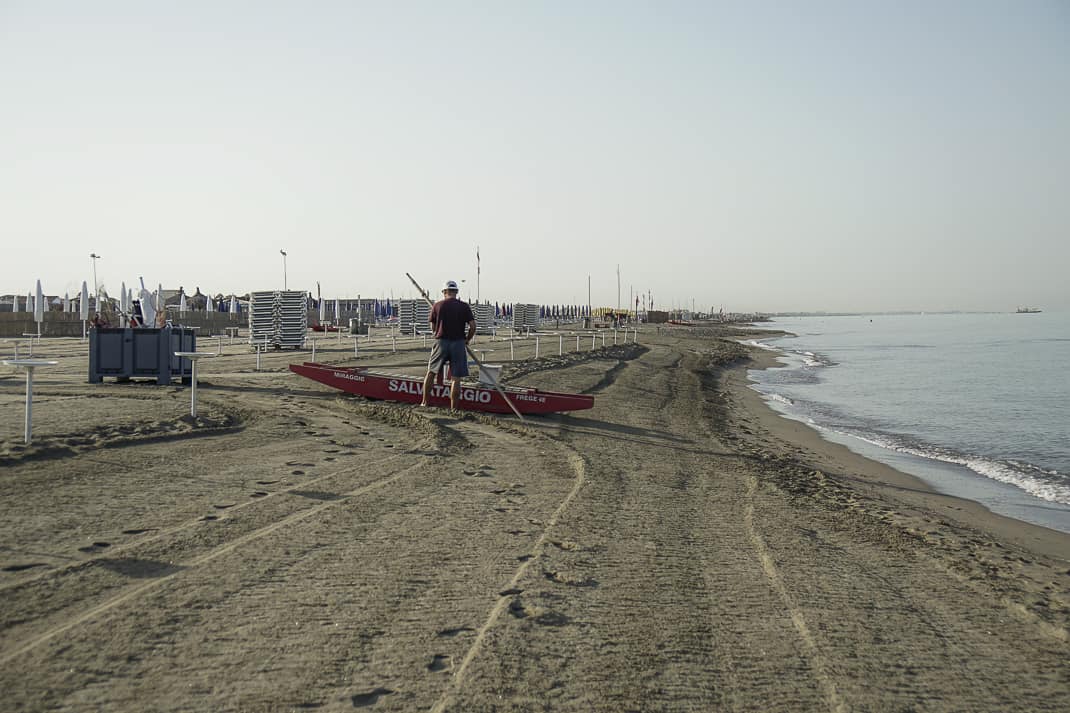
Fregene is also oh, so convenient. It’s a 30-minute drive from Rome. It’s 15 minutes from Rome’s Fiumicino Airport. We can leave Rome at 8 a.m. and be under the sun on a near-empty beach by 9.
Fregene (pop. 6,445) means a lot to Rome. It means childhood memories. Tiziana Ferrara is one of our best friends and has been coming here since the 1970s when she was a little girl. Her family loved it so much they bought a summer home here in 1985.
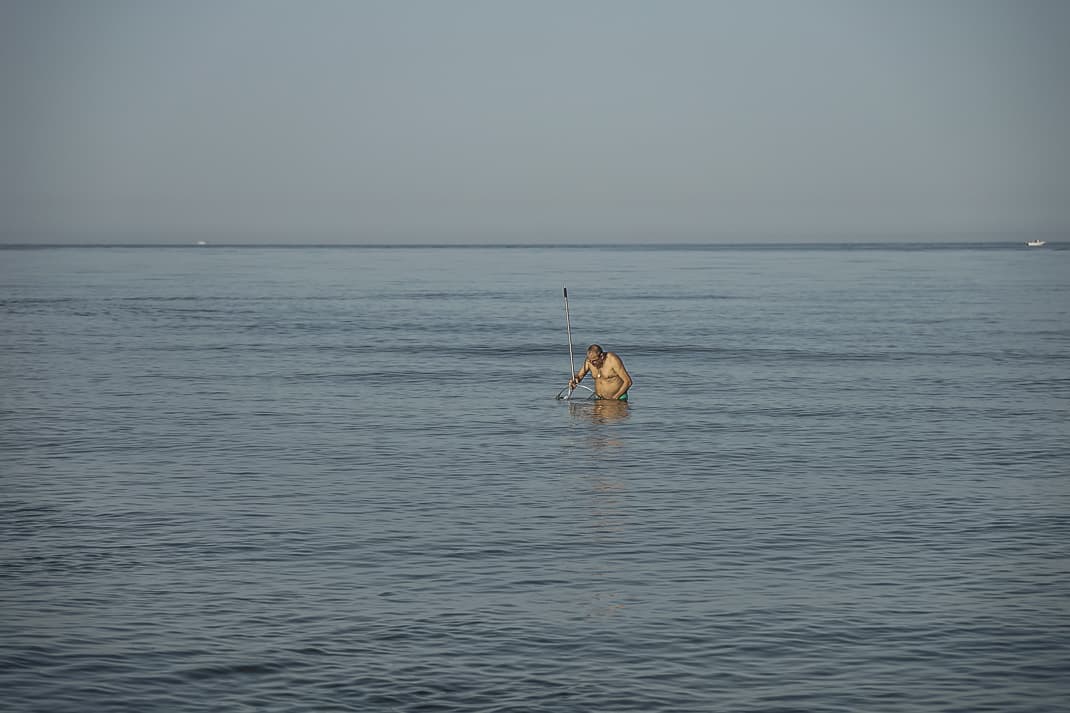
“On summer Sundays, my family and I organized picnics with our friends in the historic pine forest of Fregene,” she wrote me in an email. “My mom cooked a delicious lunch we ate in the nature! We took with us a little table and chairs. My friends and I played soccer, Frisbee, petanque (bocce in Italian) or we went on the swing arranged between the two trees, and we were happy!!!!”
Fabrizio Monaco is the editor of the local newspaper, Qui Fregene, and has lived in Fregene since 1961 when it was reaching its heyday.
I asked him what he loved most about the town. He emailed, “Fregene is the destination of the first swimming in the sea, of the first cycling of children but above all the place where entire generations live their most beautiful moments, the beach holidays with families who alternate in this world, children who become fathers and then grandparents, poignant memories, the cycle of life linked to a house, a factory, a room, a memory.”
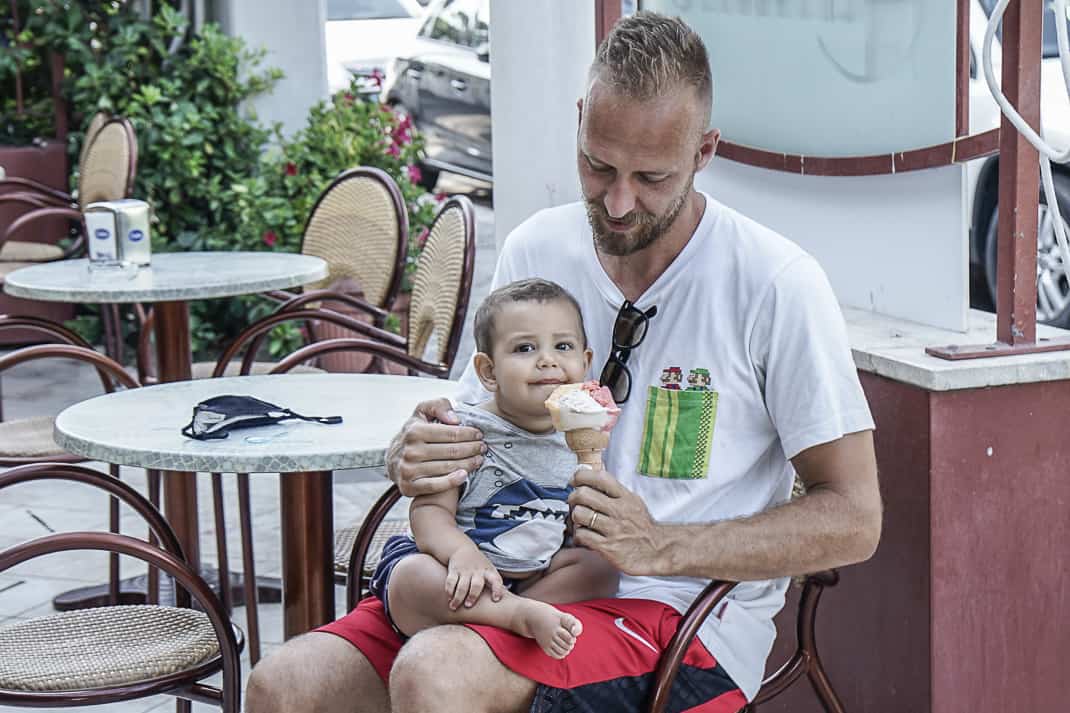
Fregene’s history goes way beyond theirs. It dates to 245 B.C. in the time of the Roman Republic when it was a maritime town near the mouth of the Tiber River. In the 1660s, Pope Clement IX planted the pine forest to help soak up the muck from the mouth of the Tiber.
The town was officially created in the 1920s as part of Mussolini’s massive drainage project to create seaside resorts. In 1926 a company called Marina e Pineta wanted to create a high-end seaside resort with marble columns lining the promenade, Swedish wooden cabins, a glass and wood tea room, a hippodrome for horse races and small houses in the forest.
Celebrities who came here
In 1933 the company went bankrupt but in the 1950s, beach clubs sprouted like palm trees. In the ‘60s and ‘70s it boomed along with the Italian film industry. Filmmaker Federico Fellini had a villa here. Frequent visitors included director Pier Paolo Pasolini and actor Marcello Mastroianni. Tiziana recalls spotting celebs such as TV host Maurizio Costanzo, actress and model Florinda Bolkan and Spaghetti Western actor Giuliano Gemma.
Marina and I don’t spot anyone of note. In fact, in five years coming here, we can’t recall seeing any foreigners. This is an Italian beach town for Italians. It couldn’t be more Italian if mandolin players strolled the beach.
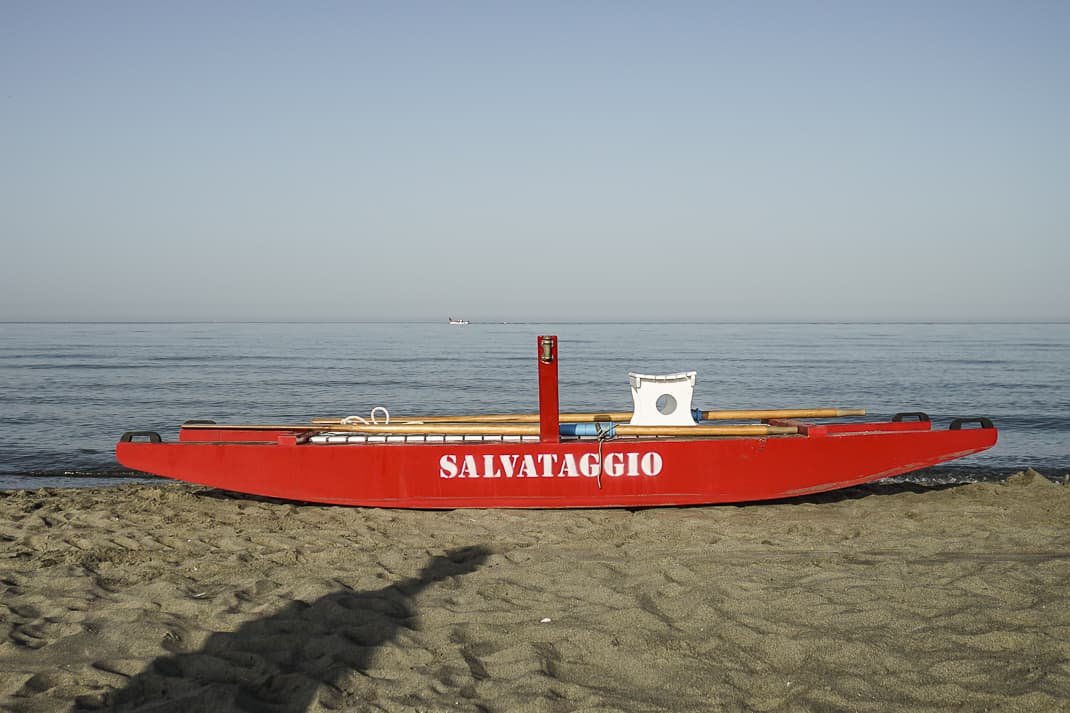
And few places are more Italian in Fregene than Il Capanno dei Pescatori. Its parking lot charges only 5 euros and walking in it looks like one of the thousands of coffee bars scattered around Italy. It’s a long bar where locals drop by for their morning cappuccino and cornetto and the man behind the counter always has a wry joke about soccer or the weather.
Il Capanno’s restaurant belies the simple foundation. We lay in the sun until about 1 then take a seat at one of the white tables with matching umbrellas in the sand. We order grilled octopus or spaghetti di mare or seafood salad or the grilled fish of the day. We wash it down with a bottle of white Trebbiano, a trademark wine of the Lazio region, and look out at the sea.
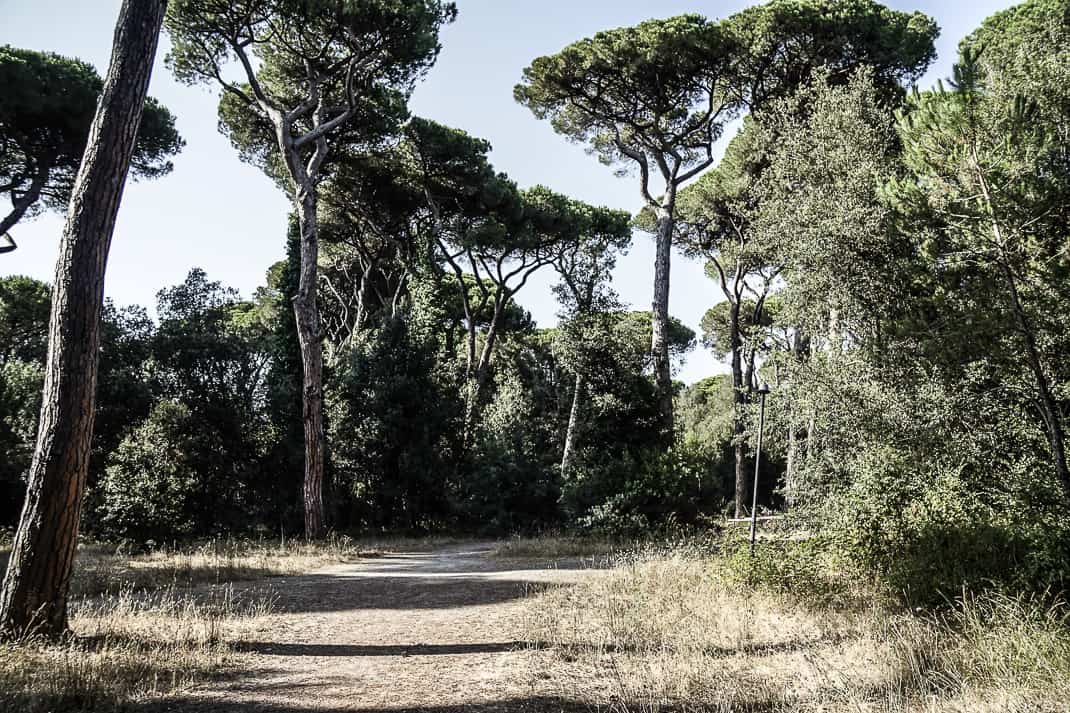
Instead of driving home Wednesday, we walked off lunch in the forest. Smack dab in the middle of town, the forest has a towering canopy of Mediterannean pines that puts many of the meandering dirt paths completely in the shade. It’s the perfect jogging path, void of many people. We see only one other couple. On a 93-degree day, the forest was as cool as a dip in the ocean with a nice breeze coming off the sea. All we could hear were crickets and the dirt and leaves crunching under our feet.
Marina showed me the spot where when she was little 15 members of her family would come for a picnic. Hardly a speck of garbage is in sight, a delightful change from Rome which I’ve written is the filthiest — and second filthiest — capital in Europe.
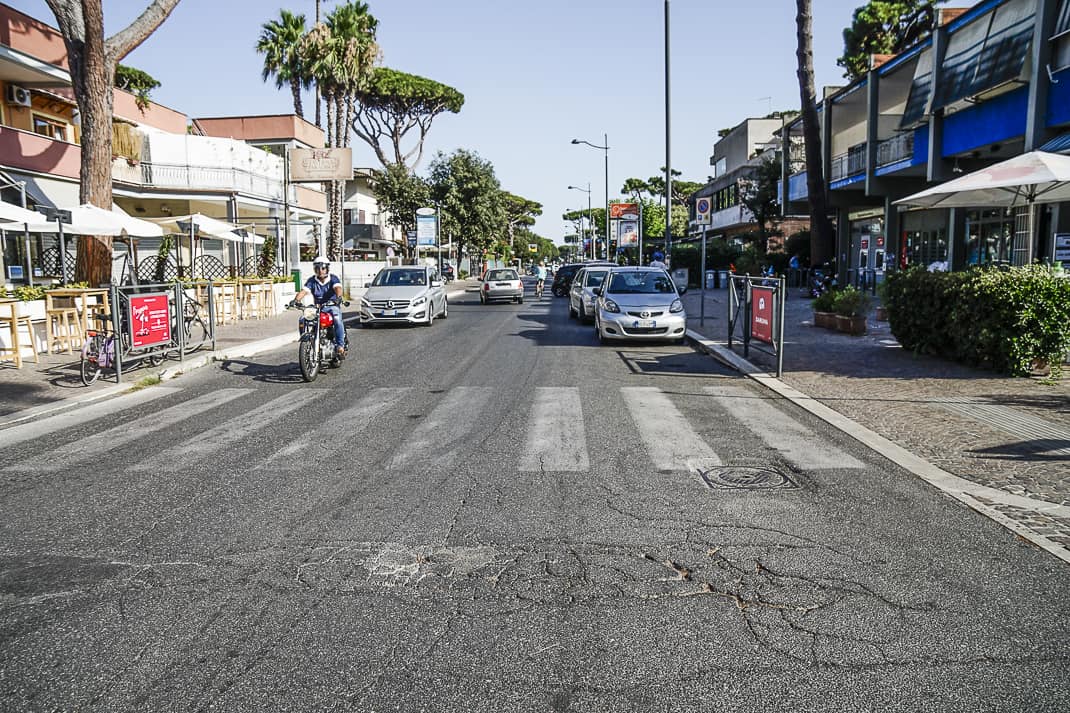
Emerging from the forest, we walked down Fregene’s main drag, Via Castellammare, Marina takes me down memory lane again. We walked past the pasticceria where she and her friends would stop for cornettos after dancing all night in the ‘80s at one of the rollicking dance clubs dotting the beach back then. She points to Gilda, looking a little old and tired but was the club to be before the recession, the euro and the pandemic.
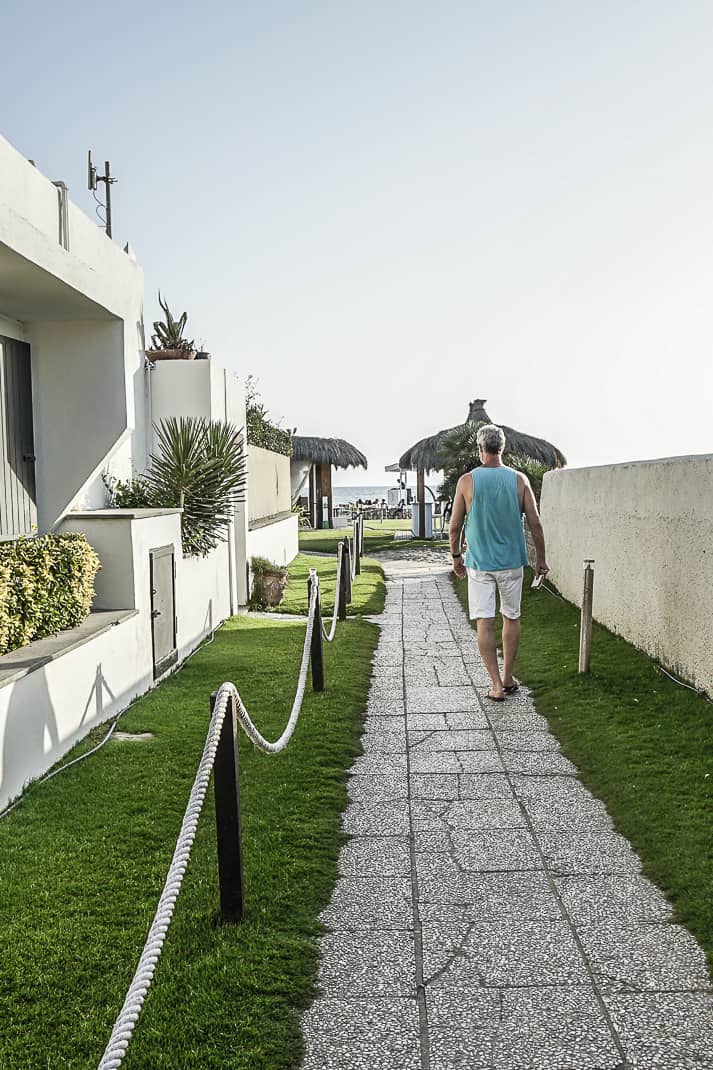
The Villaggio dei Pescatori is a clash of eras. We walked down the narrow sidewalks past the neat second homes where royal blue doors and fences against the white paint reminded me of little islands in Greece. It was just as quiet. The main road was way behind us. We passed very few people.
Then we took a roped, wooden path toward the beach. The path opened to a massive expanse of sand and hundreds of people gathered at tables. Giant thatched huts, looking like the tops of giant camels, stood nearby. Pretty waitresses in long black gowns split waaaaay up the middle shepherded cocktails and bar food to a very young crowd.
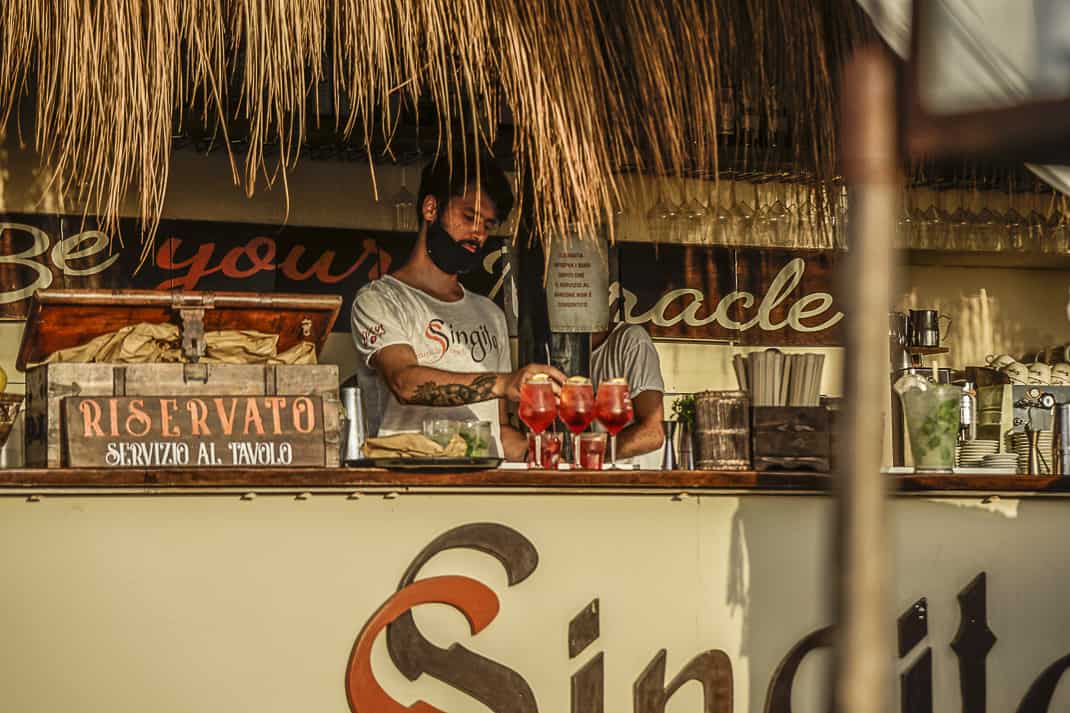
Welcome to Singita, the beach bar that time forgot. It’s famous around Italy for fantastic sunsets heralded by a giant gong that hangs not far from the tables. Masks are mandatory and I was scolded when I approached the bar wanting to order. A waitress made her way to our table and I ordered some concoction called a Gentlemen’s Negroni.
It’s 9 euros. OK, we’re paying for the view which is a fiery sun setting slowly on the horizon. When the drink arrived I realized this part of Fregene isn’t a quaint fishing village. It was basically six ounces of about six different alcohols in a small glass filled with enough ice to play a hockey game. I finished the bitter mess in about four sips and got the bill: 10 euros. They even charged me for the tax.
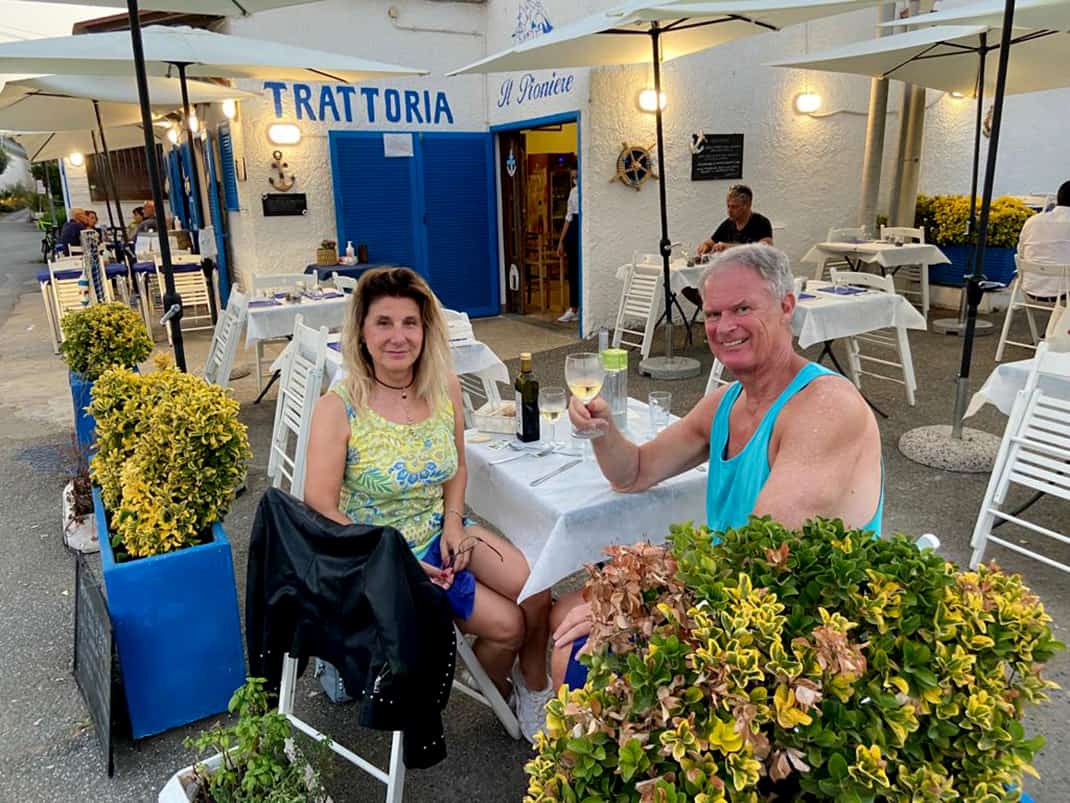
We bolted and returned down the path to the Fregene we know and love. Il Pioniere is a laid-back fish restaurant splashed in white and blue. Shoes are optional but masks upon arrival are not. I had a luscious spigola filletto in crusta di pistacchio (swordfish fillet in pistachio crust) and Marina had orata in crusta di patate (sea bass in potato crust).
Fregene is as ideal as an Italian dream. We even looked at housing prices and saw no bargains. But beneath the sand, the seafood and the serenity problems remain. Fregene was part of Rome until 1992 when it and Fiumicino became independent. Monaco, the newspaper editor, said it could use some help.
Fregene has problems, too
“Fregene is incomplete,” he wrote me. “No municipal administration has ever wanted to finish the work. There is no street lighting in some areas. The sidewalks, the streets, the promenade, the cycle paths, urbanization works never done. It could be a jewel with little but its destiny still seems to be that of 1926: a magnificent unfinished.”
The pandemic has made the world much bigger for all of us. Marina and I would like to hop a plane and see another corner of the world as we always do in summer. But until the planet behaves and Covid-19 leaves us alone, we’ll don our masks and go to the one corner of our world that never disappoints us.
Salute! Fregene! To your health. In this period, we need places like you.


August 5, 2020 @ 12:15 am
Michael (Kesten) and I are jealous of your being in Italy. It may be ages until we can, as US citizens, visit – and we love Italy. But good for other countries’ excluding us until we can be selfless enough, despite our idiotic leadership, to bring this under control.
Of course, being in Oregon with a wonderful garden and temperate climate, we don’t have an intolerable alternative. We are having a wonderful summer and Michael’s garden is in full swing. But still, wish we could’ve met you and Marina sooner.
Thank you and Marina for keeping the rest of us posted.
Deb Schallert
August 5, 2020 @ 9:50 am
Salute! As I travel vicariously through your and Marina’s excursions this Summer, I want to thank you for leaving Singita beach bar when you did. I couldn’t stay a second longer!
August 5, 2020 @ 2:17 pm
I feel like I just got back from this cool little unknown beach time, Fregene!
Great job John. I want to publish this on GoNOMAD!
August 18, 2020 @ 1:30 am
Thanks for the kind words, Deb. My friends in Oregon brag about how abiding Oregonians are about the masks. Too bad the police brutality is overshadowing the peaceful protests. We’re getting news about it over here. Italy is experiencing a recent spike and the prime minister just closed all the discoteches and made masks mandatory from 6 p.m.-6 a.m. No one stormed government buildings brandishing rifles. Imagine that.
August 18, 2020 @ 1:32 am
Thanks, Mike. Yeah, Singita truly sucked. It’s like Campari. It looks good but after one taste you want to dump it.